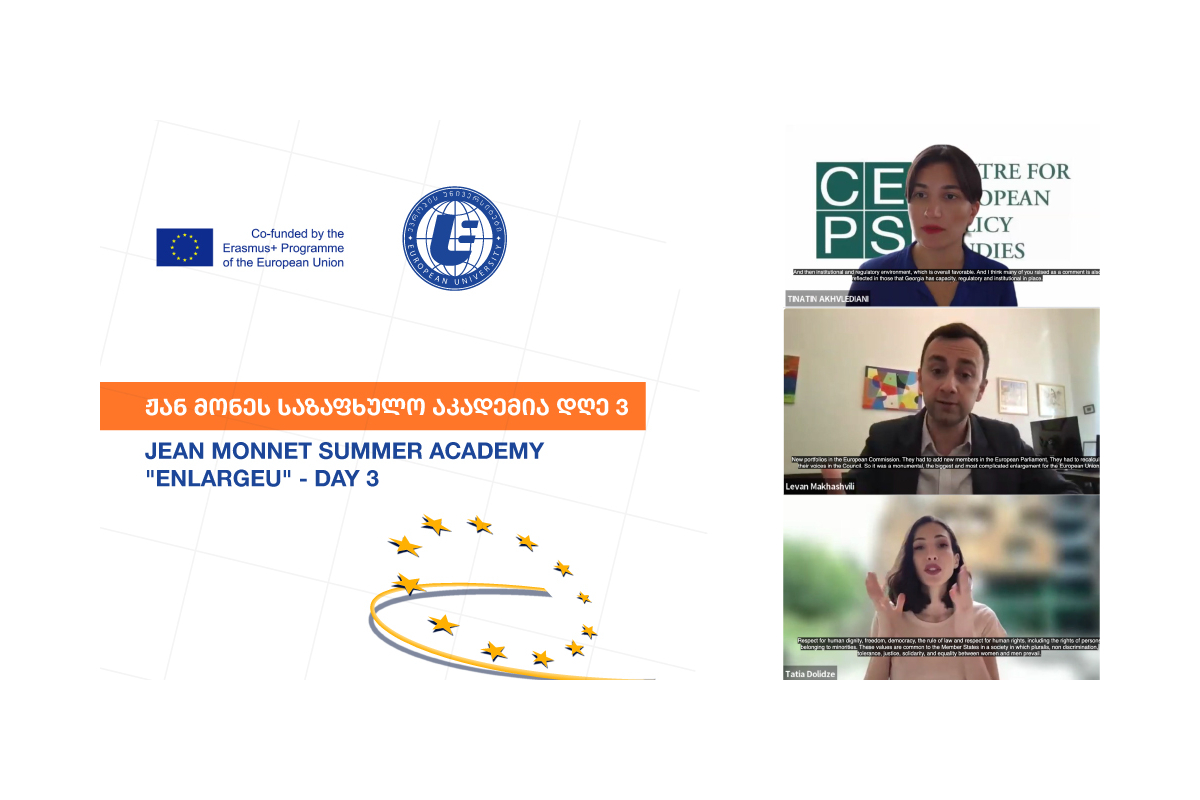Jean Monnet Summer Academy "EnlargEU": Day 3
The third day of the Jean Monnet Summer Academy "EnlargEU" brought a comprehensive exploration of the multifaceted process of European Union enlargement.
Tinatin Akhvlediani, a Research Fellow at CEPS in Brussels and a Visiting Professor at the College of Europe and ISET of Tbilisi State University, opened the session with an insightful examination of the economic criteria essential for joining the EU. She began by outlining the two primary economic conditions: the existence of a functioning market economy and the capacity to withstand the competitive pressures of the EU’s single market. Akhvlediani elaborated on the necessity of sound economic governance, macroeconomic stability, and the effective operation of markets—including those for goods, services, financial products, and labor. She emphasized that a candidate country’s ability to meet these criteria hinges not only on economic policies but also on the strength of its institutions and regulatory frameworks. Focusing on Georgia, Akhvlediani assessed the country’s progress in aligning with these economic standards. She praised Georgia's advancements in economic reforms, particularly in areas like market liberalization, public finance management, and the fight against corruption. However, she also pointed out ongoing challenges, such as managing inflation and improving labor market competitiveness. Akhvlediani noted the critical role of international institutions, like the European Commission and the International Monetary Fund (IMF), in supporting Georgia's efforts to fulfill these stringent requirements.
Levan Makhashvili, Head of Cabinet of the Chairman of Parliament at the Parliament of Georgia and Associate Professor at European University, provided a detailed review of the EU’s seven rounds of enlargement. His lecture traced the historical trajectory of the EU’s expansion, from the early days of European integration to the most recent enlargements. Makhashvili highlighted how each round of enlargement presented unique challenges and opportunities, requiring significant preparation and adaptation by both the EU and the candidate countries. He illustrated his points with case studies from each enlargement, discussing key actors like the European Commission and national governments, as well as the main obstacles, such as economic transition, political instability, and public skepticism. One of the key takeaways from Makhashvili’s lecture was the increasing complexity of the enlargement process over time. As the EU’s standards for membership have become more rigorous, both the union and aspiring members must now demonstrate a higher level of readiness. Makhashvili emphasized the importance of geopolitical considerations, noting how the interest and support of existing EU member states are crucial for successful enlargement. He also reflected on the lessons learned from past enlargements, which provide valuable insights for future expansions.
Tatia Dolidze, Jean Monnet Module Academic Coordinator and Associate Professor at European University, concluded the day with a thorough exploration of the legal framework that governs EU enlargement. Her lecture traced the development of EU treaties from the founding documents, such as the Treaty of Paris and the Treaty of Rome, to the current treaties that define the union’s legal and institutional architecture. Dolidze focused particularly on Article 49 of the Treaty on European Union (TEU), which outlines the conditions and procedures for a country to apply for EU membership. She discussed the Copenhagen Criteria, which set out the economic, political, and legal standards that candidate countries must meet. Dolidze also touched on Article 50 of the TEU, which governs the withdrawal of a member state from the EU—a topic of significant relevance in the wake of Brexit. Throughout her lecture, Dolidze emphasized the importance of adhering to the values enshrined in Article 2 of the TEU, including democracy, the rule of law, and respect for human rights. These values, she explained, are fundamental prerequisites for any country seeking to join the EU. Dolidze concluded by discussing the procedural complexities of the enlargement process, highlighting how these legal frameworks have been applied in practice and the challenges they pose for both the EU and candidate countries.
Day three of the Jean Monnet Summer Academy "EnlargEU" provided participants with a rich understanding of the various dimensions of EU enlargement. Through the expert analyses of Akhvlediani, Makhashvili, and Dolidze, attendees gained valuable insights into the economic, historical, and legal challenges that define the process of joining the European Union. This session not only deepened their knowledge of EU enlargement but also underscored the rigorous standards and extensive preparations required for countries aspiring to become part of the European Union.




